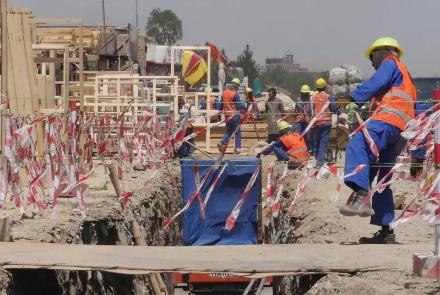Officials said work on a big water supply project in Kabul is underway and that its first phase will be completed by the end of this year.
This phase of the Medium-Term Program project, also called as MPT, encompasses construction of a water reservoir on Wazir Akbar Khan hill in Kabul.
The project will benefit 130,000 families in PD10 and PD4 of Kabul, said Mohammad Latif Mozafarkhail, head of a water supply and canalization company in Kabul.
The water for the first phase of the project is supplied from Qala-e-Hasan Khan, a remote part in the center of Kabul.
The water reservoir for the project will have 7,500 cubic meters of capacity. The project totally worth $100 million funded by USAID, Germany - KfW Development Bank and France Development Bank.
Work on the project is being run by an Afghan and a Turkish company.
The Medium-Term Program is part of a 20-year project which will be implemented in four phases, officials said.
“Right now, work on up to 75 percent of (first phase of) the project has completed. The second phase includes construction of a water reservoir and the third phase is extension of the network. The project starts from the PD4 and continues to PD10 in Taimani to Lab-e-Jar area in Khairkhana,” Muzafarkhail said.
Lack of water has become an endemic problem for Kabul residents recently as water reserves in the city have reduced to an unprecedented level.
On July 13, the National Disaster Management Authority (ANDMA) has warned that underground water reserves in Kabul will dry up within the next 10 years amid an increasing demand and use of water in the capital city.
Thirty-two million cubic meters of water is used from Kabul’s underground water reserves every year while the capacity of the city’s water is 29 million cubic meters in a year, head of the authority, Najib Aqa Fahim, said at a ceremony on Thursday.
There are 213,000 wells in Kabul City, he said, adding that “it is a crisis” for the residents.
Statistics show that dozens of companies are utilizing Kabul’s underground water for their businesses. Officials say it is illegal.
Some residents of Kabul’s PD10 who live in irregularly-built areas such as Bibi Mahro, Qala-e-Wakil, few meters from Wazir Akbar Khan area, said people in that part of Kabul are facing with severe lack of water.
A large percentage of people are using from wells in their houses while a low percentage are benefited from government-owned water supplying system.
“We are faced with lots of problems in terms of our access to water,” one resident of Bibi Mahro said.
“The water reserves are dry. You will not be able to get water from them even if you dig a 60-meter well,” a resident of Kabul said.
Last year, the World Health Organization stated in a report that at least 3 in 10 people worldwide, or 2.1 billion, lack access to safe, readily available water at home, and 6 in 10, or 4.5 billion, lack safely managed sanitation.


